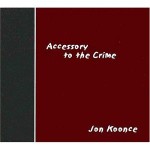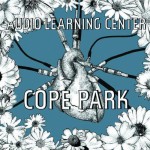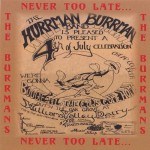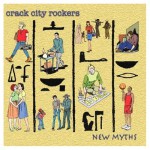Jon Koonce
 Accessory To The Crime
Accessory To The Crime
Moon Records
Jon Koonce has come full circle in the business of music. In his thirty-plus years involved in local music, he has gone from being the young turk drummer for the Sleezy Pieces in the early ‘70s club scene, to stepping out from behind his kit to front Hank Rasco’s Wasted Rangers (which soon became the first incarnation of Johnny & The Distractions)- rapidly becoming a local star along the way. By the end of the ‘70s the major labels were calling and Koonce was able to release three albums on major labels before the plug was pulled.
A bit bruised, but defiantly undaunted, Jon returned to the Portland music scene, not so much with a sense of defeat, as with a renewed appreciation for the vibrant musical community that continues to exist within the city. For the past twenty years, Jon has been honing his musical focus, while leading a host of different local bands including Mystery Train and the Gas Hogs, to name just a couple.
But in the past few years, he has gradually refined his stylistic approach down to nearly zen-like simplicity. With this album, as with its predecessor, Train Fare Home, Koonce relies on the simple accompaniment of his solitary acoustic guitar, backing his singular, gritty voice, to tell his tales of common folk, whose weary travails often seems unrelentingly desolate.
From more personal numbers, such as “Some Things I Can’t Let Go” and the Craig Carothers penned “I Guess I Showed Them,” to more universal perspectives such as “Rich Man’s War” and the touching baseball ballad “Jim Crow Ball,” Jon covers a lot of emotional ground without resorting to the typical conventions of rock and roll. Similar in approach to Bruce Springsteen on his album Nebraska, Koonce foregoes filigree and coloration for the subtle contrasts of black and white settings- stippled by a stark array of gray shades.
The first track, “Some Things I Can’t Let Go” is a sauntering shuffle in E major, over which Jon lays some tasty guitar licks and fills; while, with facile leaps into a falsetto register, he sings: “You can tell me to forget/all the reasons you can show/But now it’s me in the night/And some things I can’t let go.”
The harsh reality of “Keep the Home Fires Burning” is belied by the somewhat cheery chord progression and Koonce’s wry, John Prine-like delivery of some caustic lyrics. “I used to have a career/I used to have a home/Then came that new word downsize/And all those things were gone/I was headed for retirement/I was gonna buy a yacht/But now I have this campfire/In this vacant parking lot… I spent my severance package/Tryin’ to start anew/Until flippin’ burgers is all that’s left to do/But to my disappointment/The jobs’d all been filled/By teachers and professors/Developin’ new skills.” The song would be a lot funnier if it weren’t so painfully true.
The same can be said for “Rich Man’s War,” a Dylyanesque piece, minor-key, capoed on the 4th fret- with anthemic choruses (similar to Dylan’s “The Times They Are A-Changing”), which include the rousing lines: “Widows and orphans, cry themselves to sleep at night/Corporations get in line there’s contracts to write/A rich man’s war and a poor man’s fight.” These lines become more pertinent with the passing of each day- and the inexorable reality of not only the downsizing of large corporations, but now the “outsourcing” of traditional white-collar jobs to locations abroad- and that our new jobless economic recovery is merely a bonus for the rich, while the whole of middle class America become indentured into lifelong servitude.
Another poignant slice of Americana, is Jon’s telling of the true-life tale of baseball player “Luscious” Luke Easter, whose best years were spent toiling in relative obscurity in the Negro leagues. At age of 34, Easter was finally allowed to play for the Cleveland Indians of the American League, for whom he hit 32 home runs in 1952. Easter later went on to play in the minor leagues until he was nearly 50 years old. However after finally retiring from baseball, Luke was tragically murdered- shot to death by holdup men, while working as a bank messenger. Koonce nicely captures Easter’s tale, creating one of the best baseball songs of all time.
Craig Carothers’ “I Guess I Showed Them,” is a somber ballad, in which Jon sounds kind of like Leonard Cohen singing a Prine song in a horrific tale about an homicidal arsonist bank robber. As if to serve as a bit of levity, “Edward & Loretta’s Motel” is a light-hearted delta blues-laced number about the everyday activities at an out-of -the-way motel. “Different” is more of a confessional, biographical type of number, about people who tend to march to the beat of different drummer.
Early Dylan, Warren Zevon and John Prine are recalled in the gospel tinged “Borderline,” wherein Jon adds plaintive harmonica fills, over a narrative about the destitute lives of migrant workers. On the hauntingly beautiful title track, a weary sounding Jon confides: “In the comfort of your armchair/ You feel safe, you like it there/Too aloof to get involved/You are above it all/In the right costume/At the right pace/Fear can pass for grace/Or maybe you just don’t have the time/Accessory to the crime.” Later, the true statement Koonce wishes to make becomes more readily apparent. “Democracy is wounded/Down on one knee/ I pray that’s enough to shake your apathy/The silence will not hide/No safety in numbers you’ll find/Accessory to the crime.” A very rueful declaration.
The prayerful hymn “Walking in the Light” provides cathartic redemption for the sins exposed through the course of the preceding ten songs, adding an element of hope to the profound sense of resignation expressed throughout the album.
Jon Koonce has been through the wars and has earned his right to express himself in anyway he wants. The means he chooses here are the most naked possible: just a man and his guitar. But his presentation is hones, his subject matter universal and his sentiments, shared by millions, speak to the heart of true Americana in its most current of aspects. In this way, especially, Koonce’s work here is both cathartic and subversive, but sadly prescient in its estimation of the low state of the human experience, in this nation today.
Audio Learning Center
 Cope Park
Cope Park
Vagrant Records
Audio Learning Center have an authentic pedigree, having two members who graduated with honors from the Portland music scene of the ‘90s: guitarist/backing vocalist Steven Birch of Sprinkler (who was also a key player in the famed Satyricon “riot”), and later of Everclear and bassist/vocalist Chris Brady, formerly of Pond. Along with drummer Paul Johnson, the band pound out a sound that at various times calls to mind the likes of Hoobastank, Queens of the Stone Age, Silverchair, Pavement, Grandaddy, Fountains Of Wayne, the Shins, Frank Black, the Flaming Lips and a host of other slightly off-kilter pop/sludge bands.
This, the band’s second album in their four-plus year history, benefits from tasty finishing touches applied by co-producer Joe Chiccarelli (who worked with Beck, Frank Zappa and Oingo Boingo), whose style lends a glistening sheen to the eleven songs (though two of the songs are under two-minutes in length), recorded in the band’s home studio. The brief opening track “Waking Up With Eyes Still Closed,“ veers from Cheap Trick Meets Spoon territory. Brady’s vocal is played against a solitary piano in the first verse, before the guitars and drums kick in with gravity, in the second verse. .Just about the time that the song seems to be moving in a musical direction, it ends.
The opening gambit of ‘The Neverwills,” a crackling guitar figure, snapping against a gamboling fugal bassline and syncopated drums, recalls XTC from their English Settlement period, while Brady‘s gritty vocals guide the song into darker, murkier, more emotionally raw territory in the choruses. Birch’s churling riffage in the break, knots like a fisted stomach of immense tension. The song ends abruptly with a guitar cable snatched from an amplifier.
The schizophrenic title track displays a harder edge, with arrangement alternating measures between a drunken interplay between Birch and Brady; and a savage onslaught on the other side. Birch provides a cascade of gnarled, Belew-like tone clusters on “In The Red,” which play against Johnson’s Ringo kick/snare interplay and Brady’s occasional one-note bass work. A percolating drone of a number, with an odd, self-referential coda.
Sounding a bit like Brady’s former band, Pond, “California” is a Floyd-like journey into the dark regions of the psyche, wherein Birch’s muscular guitars support the chorus like a massive suspension bridge over troubled waters. The middle section further reflects the Floydian aspects that the band sometimes exhibits. Here, this nicely constructed crescendo is perhaps most reminiscent of the end of John Lennon’s “I Want You (She’s So Heavy)” from the Beatles’ Abbey Road album, to which Pink Floyd also occasionally referred in their Dark Side Of the Moon period.
“Stereo” is a familiar sounding number in 6/8 time, with a signature, descending major third interval (think Eddie Vedder in Pearl Jam’s “Evenflo,” among several others) driving the vocal melody. Wrought with sentiment, it’s a love song from the road, with a truly majestic finale. More fine guitar/bass interplay decorates “Car,” as Brady relies (too much?) on his typically ragged vocal delivery to cover the intense emotional turf upon which the instrumental arrangement is treading.
Birch‘s flittering guitar figures dance atop Johnson‘s loosely tuned kick drum and a hard hitting snare in “You Get That From Your Mother,” before Brady leaps into the fray with a roilingly drone-y bass presence. Brady’s vocal approach is more laid-back in this instance and truly, much better suited to his rather frail voice than the harder material- where, vocally, he seems unable to get out of second gear. Exotic three-part vocal harmonies and cascades of guitars steer the ship through a foggy harbor. Nice.
A dizzying string pattern plays against a galumphing beat on “Passage,” pushing the syncopation to the absolute limits of a 4/4 framework, beyond XTC’s excursions in similar territory in their early ‘80s configurations. “Happy Endings is a fairly straight-ahead ballad, that seems to strongly emulate (intentionally, or not) the work of Elliot Smith- a haunting melody driving the entire delicate apparatus.
Audio Learning Center display a very high level of musicianship, which is not always matched by Chris Brady’s somewhat thin vocals and occasionally predictable vocal melodies (especially in the case of the harder material, in both cases) limit the material to a certain extent. It is not that Brady can’t carry the occasional song in a set, it’s just that he does not as yet seem to have the dynamics of vocal technique, in all instances, to accommodate the band’s often dense instrumental presentation.
This is not to say the band isn’t good or anything. They are far more musically adventurous than most- and their intricate arrangements are always handled flawlessly. It’s just that they have shortcomings, which are holding them back from greatness. How they overcome those shortcomings (and they certainly can) will be the true measure of these stalwarts.
The Burrmans
 Never Too Late
Never Too Late
Self-Produced
Back in the mid-to-late ‘70s, the Burrmans were Hurrman Burrman: who were among an elite few country rock bands (Seafood Mama, Wheatfield and Triggers Revenge were some of the others) to dominate the local club scene. Hurrman Burrman were a show band in the truest sense of the word, whose roots went back to junior high school in Grant Pass, Oregon, where the four founding members, bassist Steve Vincent, drummer Jim Sanders, guitarist Smiley Brion and drummer Al Klassen first conceived the band back in 1976.
At their peak, the Burrmans regularly held forth on the weekends at the more influential local clubs, including the Last Hurrah and Euphoria. Moreso than their counterparts, Hurrman Burrman had a looming presence from one end of the state to the other a claim which none of the competition could make. Their stage shows were legendary: a muscular cast, which included two drummers (only one kit, Klassen and Sanders alternated behind the kit and adding conga percussion) and a pedal steel guitar player backing Vincent and Brion, with all four founding members providing dense, Dead-inspired vocal harmonies (all four took the lead vocal duties from time to time, though Brion was more or less the front man). Beyond that, Klassen was quite proficient on the harmonica, which lent another dimension of color to their sound.
But most spectacular of all was the appearance within their stage show of “Johnny Smash and the Marijuana Brass,” whose take on the Johnny Cash songbook was raucously over the top. Donning sombreros and serapes, Vincent, Sanders and Klassen would also act as the Marijuana Brass, punctuating Brion’s Smash interpretations with sloppy horn (Sanders played trombone, while the other two played trumpets) interjections, while continuing to play their regular instruments as well. Their somewhat vulgar, riotous version of Johnny Preston’s ‘50s hit “Running Bear” was also a crowd-pleasing institution, as well.
As the ‘70s came to a close, musical tastes of the public began to change. Sensing the shift, Hurrman Burrman retired, firing their original pedal steel player and replacing him with Ron Stephens- a member of Hank Rasco’s Wasted Rangers, when Johnny Koonce more or less took over the band, calling them the Distractions (for whom Stephens helped to engineer their first, locally produced recordings). With Stephens on board, the band briefly became Sleeper, before embarking upon an extended USO tour of military bases across Asia, which, while lucrative, did nothing to further the bands’ career.
Upon returning stateside, the band essentially broke up, for all intents and purposes, to pursue (with the exception of Sanders, who has toured as a sound technician with some of the biggest acts in show business) careers outside of the music business- although they still occasionally got together for various events and functions. In 1994, Al Klassen died suddenly, at the age of forty, leaving a void within the band, which is still strongly felt today.
Here, we find the band (which includes vocalist Stevie Mercer) and a host of guests, recording the album of original material which they had been threatening to record twenty five years ago. For, back in those days, the Burrmans were primarily a cover band, playing the songs of notables such as Jackson Browne and New Riders of the Purple Sage, among many others. Often, they dredged up chestnuts, such as Tex Williams’ “Smoke, Smoke, Smoke That Cigarette” (which he co-wrote with Merle Travis, who also wrote “Sixteen Tons”); while peppering their sets with the occasional original composition. Here, all thirteen songs are band penned.
The album kicks off with a couple of songs written and sung by Smiley, “Mighty River” and “Waterfalls.” The former is a country inflected ballad, reminiscent of Mike Nesmith, where Smiley’s voice resonates like that of Roy Rogers or Clint Black- while Stephens provides soaring pedal steel interludes and Mercer the high vocal harmonies. “Waterfalls” is a rocking number with a snakey. low-string guitar line, ala Steve Miller, and with Smiley’s vocal evoking Bob Weir of the Dead and Carl Wilson of the Beach Boys.
Vincent’s “The Story” is steel guitar-ladened vehicle for air-tight three-part vocal harmonies. Stephens’ “Fallin’” captures the vocal blend of Crosby, Stills and Nash, circa “Suite Judy Blue Eyes.” Smiley’s turn with “Jackie,” a Cajun-flavored gumbo, changes the pace- with guest keyboardist Atillio adding concertina-like punctuation, over the syncopated beat.
Vincent’s lovely “Take A Chance” hearkens back to Marty Balin’s “Comin’ Back To Me” from Jefferson Airplane’s Surrealistic Pillow; with rich vocal harmonies embellishing the sonic landscape. A real winner. Meanwhile, Smile’s “Cadillac” is a Weir-like shuffle with Little Feat-like undertones, nicely augmented by Mike Walker’s lively Hammond B3 interjections. The Little Feat-like feel continues with Smile’s “Relentless Love,” a song that would seem right at home in the repertoire of Lyle Lovett.
Mercer’s take on Vincent’s beautiful “November Rain” demonstrates a Linda Ronstadt-like feel, while the song itself reaches back to Patsy Cline’s rendition of “Wayward Wind,” written by Herb Newman and Stan Lebowsky. Another gem. A funky Little Feat feel informs Vincent’s “If You Don’t Love Me,” with longtime band associate Willie Warwick adding sprightly fiddle in the turns. Vincent’s “Weak In The Knees” is most certainly evocative of Steve Miller.
Warwick returns for Smiley’s “I Hope He’s As Good,” which features all of the elements that make for a classic Hurrman Burrman number, with great solo trade offs between Smiley on acoustic guitar, Warwick on fiddle and Ron Stephens on electric guitar and pedal steel guitar, and tight three-part vocal harmonies. Similarly, Brion’s “The Bridge” captures all of the aforementioned, prototypical elements that are Burrman.
The Burrmans have changed surprising little since their heyday twenty five years ago. Their sunny optimism and tuneful musicality are still everywhere rampantly evident on this project. Despite the loss of the indefatigable Al Klassen, the Burrman’s toil on into their fourth decade as a band, with all their most winning attributes still very obviously in tact.
Crack City Rockers
New Myths
The Paisley Pop Label
It’s been just over two years since we last heard from CCR, headed by the devilishly quixotic Eric S. Gregory whose musical influences span the decades and include Bowie, T. Rex, Lou Reed, the Stones, Love and Rockets and Supergrass, to name but a few. The band has remained intact, with Gregory fronting the ensemble, backed by guitarist Dennis Mitchell., bassist Sean Flora (who adds keys, guitar and background vocals to the mix) and drummer Curt Schulz. As before, sax man John “Kid Presley” Leubner (formerly of Jesus Presley) adds fine horn sections to a couple of tracks. The sum of the parts is a potent mixture to be sure, only more polished and precise in the two years which have ensured since their last release. They were certainly no slouches before, however.
The half dozen songs presented here reflect Gregory’ passions, which include a Bukowskian fascination with sex and the underbelly of existence, with themes that touch upon black magic and the occult. Gregory is eloquent and poetic in his lyrical excursions, exhibiting either an unusual philosophy of life, or a vivid imagination. Or both.
The X-rated, horn-driven “Glory Of The Sun” could pass for Ziggy-era Bowie or T Rex in all its reptilian charm. Mitchell contributes fiery licks at the turns, while Schulz pushes the beat. Well executed- in two minutes flat “Perfect Life” sounds like “Bang A Gong” T Rex, with a touch of “I’m Alive” era Love And Rockets( possibly the same thing).
The winning number of the set is the transcendent “Truth Drug,” which echoes the ‘60s song (Paul Revere & the Raiders and the Monkees) “Not Your Stepping Stone,” while churning out a snarling stance of its own, balanced on a rolling bassline and pinioned by jagged, soul-drenched guitars. Very cool! “Occult Piss“ sounds like early Supergrass, mixed with latter-day Squeeze-with a memorable chorus and some impressive guitar work in the turnarounds.
“Estrogen Mess” continues the high energy approach, with a hyperactive delivery an d frenetic instrumentation. The same can be said for “Already Dead,” which inspects the state of Gregory’s existence: “I’ve got a way of holding pain in/A methodology to closing my heart off/Where a door opens wide/ Then closes with a cough.”
The Crack City Rockers display a flair for high energy rock, with a twisted world view; as well as impressive skills at executing their oddly compelling brand of rock and roll. Gregory’s heady, erudite lyrics and the overall high level of musicianship help to make the Rockers one of the more accessible bands in town, with a sense of humor and a propensity for wicked fun.

